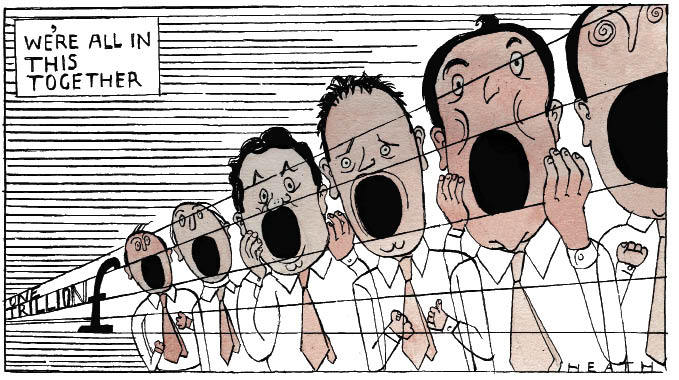George Osborne, the Chancellor of the Exchequer, said he would hold an emergency Budget on 22 June. He announced the setting up of an Office for Budget Responsibility under Sir Alan Budd, one of the original members of the Bank of England’s Monetary Policy Committee in 1997. The office would publish its first economic and fiscal forecasts before the Budget. In the meantime the government looked for £6 billion of savings to make this year. Mr David Cameron, the Prime Minister, sought, as an adviser on poverty, Mr Frank Field, the Labour MP asked in 1997 to ‘think the unthinkable’ about welfare reform and sacked as a minister when he did so. MPs reappointed Mr John Bercow as Speaker. Mr David Miliband, the former foreign secretary, stood as a candidate for the leadership of the Labour party. ‘New Labour is not new any more,’ he said. ‘What counts is next Labour.’ His younger brother, Mr Ed Miliband, became his first rival. The rate of inflation measured by the Consumer Prices Index rose to 3.7 per cent, and, by the Retail Prices Index, to 5.3 per cent, its highest for 19 years. Senior civil servants had, it emerged, demanded ‘letters of instruction’ from ministers during the last months of the Labour government to authorise decisions on items of high public expenditure. Mr David Laws, the Chief Secretary to the Treasury, said that he found a letter on his desk from his predecessor, Mr Liam Byrne, reading: ‘Dear Chief Secretary, I’m afraid to tell you there’s no money left.’ Someone from Britain won a lottery prize of £84.4 million, the highest sum ever.
Fine ash from the Eyjafjallajökull volcano in Iceland drifted over Britain again, closing airports for a day or two. Once it had gone, the Civil Aviation Authority doubled the density of ash allowable for some flights. British Airways won an injunction to prevent air crews belonging to the Unite union going out on strike for four days, the first instalment in 20 planned strike days. A special immigration court ruled that Mr Abid Naseer, arrested last year but never tried, was an al-Qa’eda operative but could not be deported because he faced torture back home in Pakistan. Prudential announced a rights issue to raise £14.5 billion from shareholders to pay for its planned acquisition of the AIA group, the Asian arm of AIG. Prudential had delayed the issue a fortnight earlier after intervention by the Financial Services Industry. Revenues from Asia and Africa helped pre-tax profits for Vodafone to double to £8.7 billion. Lord Triesman resigned as chairman of the Football Association and of the board promoting England to be host of the 2018 World Cup, after he was recorded remarking on a bribery plot by Russia and Spain that he later said was a joke. A 16-year-old schoolgirl died rescuing her dog, Zeus, from the track at Morley station, West Yorkshire; the dog survived. A company in Northern Ireland is to make a new fleet of double-decker buses for London with an open rear platform.
BP succeeded in inserting a tube into the broken oil pipe 5,000 feet below the Gulf of Mexico, catching perhaps a fifth of the 5,000 barrels of oil a day that had been leaking since 20 April. Some had washed ashore in Mississippi, Louisiana and Alabama, but a slick 120 miles wide remained poised 40 miles out to sea. President Barack Obama of the United States appointed a commission to study oil exploitation and safety. Mr Obama’s Kenyan aunt, Miss Zeituni Onyango, who had been living as an illegal immigrant in Boston, has been granted political asylum. Mr Victor Ebokawe, known as General Boyloaf, a leader of the Movement for the Emancipation of the Niger Delta, said that Nigeria’s new President, Mr Goodluck Jonathan, was the best man to solve the crisis in the country’s oil-producing region. European Union finance ministers resolved to persecute hedge funds; a British Treasury spokesman said that it was ‘in the circumstances, the best outcome we could have expected’. Germany attempted to prohibit some kinds of short-selling. The euro sank against the dollar to a level unseen for four years. Prosecutors in Naples accused pizza shops of using firewood from dug-up coffins.
Thousands of anti-government protesters at a camp in the centre of Bangkok surrendered after troops advanced and five people were shot dead; in the previous five days in nearby streets 37 lives had been lost. A suicide car bomb killed 18 in Kabul, including five American soldiers. In Kyrgyzstan, fighting in Jalalabad between supporters of the interim government and those of the deposed President Kurmanbek Bakiyev left at least two dead. Huang Guangyu, once the richest man in China, was jailed for 14 years and fined £59 million after being convicted of bribery. President Anibal Cavaco Silva of Portugal agreed to sign a law legalising same-sex marriage passed by parliament earlier this year. In Malawi, two men in their twenties were convicted of gross indecency after celebrating their engagement. CSH






Comments